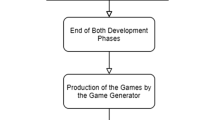Abstract
An important prerequisite to trend-aware authoring is that scenarios be authorable and inspectable by instructors but also machine-readable such that authoring tools can assist with integrating real-world patterns into training. In this research, we use a semi-structured approach to authoring flight training scenarios in which textual descriptions of related scenario elements (i.e., happening at roughly the same time) are grouped together and assigned training objectives and phases of flight. This same representation can be used to represent real-world emergencies allowing their integration into scenarios for more realistic training. Such a representation is sufficient to support a recommender that ranks possible insertion points for real-world emergencies using constraints (i.e., the phase of flight of the emergency must match the phase of flight of the insertion point) and a ranking score. Our ranking score is currently based on matching training objectives associated with the emergency with training objectives in the scenario (i.e., training the same skills but using a more realistic example). The recommender is integrated into the scenario editor such that instructors can see the ranked injection points and modify the scenario by selecting one of these points.
Access this chapter
Tax calculation will be finalised at checkout
Purchases are for personal use only
Similar content being viewed by others
References
ADL Initiative: Total learning architecture functional requirements document (2021). https://adlnet.gov/assets/uploads/2021%20TLA%20Functional%20Requirements%20Document%20w%20SF298.pdf
Bubeck, S., et al.: Sparks of artificial general intelligence: early experiments with GPT-4 (2023). https://arxiv.org/abs/2303.12712
Deaton, J., Glenn, F., Burke, C.S., Good, M., Dorneich, M.: Evaluation of an interactive electronic NATOPS (IE-NATOPS) and associated graphic interaction concepts. Final report, Office of Naval Research (2002)
Hernandez, M., Blake-Plock, S., Owens, K., Goldberg, B., Robson, R., Ray, T.W.F.: Enhancing the total learning architecture for experiential learning. In: Proceedings of the Interservice/Industry Training, Simulation, and Education Conference (I/ITSEC) (2022)
Khooshabeh, P., Choromanski, I., Neubauer, C., Krum, D.M., Spicer, R., Campbell, J.: Mixed reality training for tank platoon leader communication skills. In: IEEE Virtual Reality (VR) (2017)
Renger, R., Wakelee, J., Bradshaw, J., Hites, L.: Steps in writing an effective master scenario events list. J. Emerg. Manage. 7(6), 51–60 (2009)
Stacy, W., Freeman, J.: Training objective packages: enhancing the effectiveness of experiential training. Theor. Issues Ergon. Sci. 17(2), 149–168 (2016)
Stacy, W., Picciano, P., Sullivan, K., Sidman, J.: From flight logs to scenarios: flying simulated mishaps. In: Proceedings of the Interservice/Industry Training, Simulation, and Education Conference (I/ITSEC) (2010)
Acknowledgments
Research reported in this paper was supported by the U.S. Naval Warfare Center under award number N68335-19-C-0583, as a collaboration between Aptima, Inc. and the USC ICT University Affiliated Research Center (U.S. Army W911NF-14D0005). The content does not necessarily reflect the position or the policy of the Government, and no official endorsement should be inferred.
Author information
Authors and Affiliations
Corresponding author
Editor information
Editors and Affiliations
Rights and permissions
Copyright information
© 2024 The Author(s), under exclusive license to Springer Nature Switzerland AG
About this paper
Cite this paper
Core, M.G., Nye, B.D., Fegley, B.D. (2024). Trend-Aware Scenario Authoring: Adapting Training Toward Patterns from Real Operations. In: Sottilare, R.A., Schwarz, J. (eds) Adaptive Instructional Systems. HCII 2024. Lecture Notes in Computer Science, vol 14727. Springer, Cham. https://doi.org/10.1007/978-3-031-60609-0_2
Download citation
DOI: https://doi.org/10.1007/978-3-031-60609-0_2
Published:
Publisher Name: Springer, Cham
Print ISBN: 978-3-031-60608-3
Online ISBN: 978-3-031-60609-0
eBook Packages: Computer ScienceComputer Science (R0)




